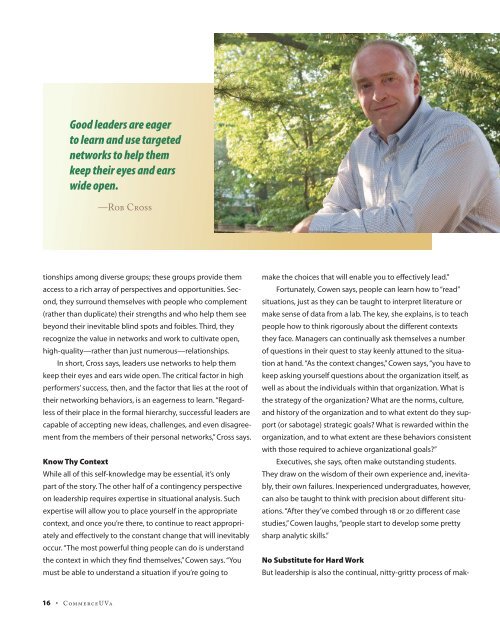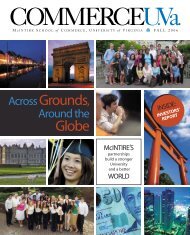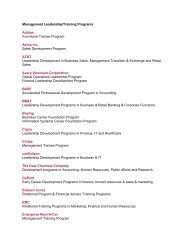CommerceUVA Fall 2007 (Investors' Report) - McIntire School of ...
CommerceUVA Fall 2007 (Investors' Report) - McIntire School of ...
CommerceUVA Fall 2007 (Investors' Report) - McIntire School of ...
You also want an ePaper? Increase the reach of your titles
YUMPU automatically turns print PDFs into web optimized ePapers that Google loves.
Good leaders are eager<br />
to learn and use targeted<br />
networks to help them<br />
keep their eyes and ears<br />
wide open.<br />
tionships among diverse groups; these groups provide them<br />
access to a rich array <strong>of</strong> perspectives and opportunities. second,<br />
they surround themselves with people who complement<br />
(rather than duplicate) their strengths and who help them see<br />
beyond their inevitable blind spots and foibles. third, they<br />
recognize the value in networks and work to cultivate open,<br />
high-quality—rather than just numerous—relationships.<br />
in short, Cross says, leaders use networks to help them<br />
keep their eyes and ears wide open. the critical factor in high<br />
performers’ success, then, and the factor that lies at the root <strong>of</strong><br />
their networking behaviors, is an eagerness to learn. “regardless<br />
<strong>of</strong> their place in the formal hierarchy, successful leaders are<br />
capable <strong>of</strong> accepting new ideas, challenges, and even disagreement<br />
from the members <strong>of</strong> their personal networks,” Cross says.<br />
Know Thy Context<br />
While all <strong>of</strong> this self-knowledge may be essential, it’s only<br />
part <strong>of</strong> the story. the other half <strong>of</strong> a contingency perspective<br />
on leadership requires expertise in situational analysis. such<br />
expertise will allow you to place yourself in the appropriate<br />
context, and once you’re there, to continue to react appropriately<br />
and effectively to the constant change that will inevitably<br />
occur. “the most powerful thing people can do is understand<br />
the context in which they find themselves,” Cowen says. “you<br />
must be able to understand a situation if you’re going to<br />
16 • CommerceUVa<br />
—Rob Cross<br />
make the choices that will enable you to effectively lead.”<br />
Fortunately, Cowen says, people can learn how to “read”<br />
situations, just as they can be taught to interpret literature or<br />
make sense <strong>of</strong> data from a lab. the key, she explains, is to teach<br />
people how to think rigorously about the different contexts<br />
they face. managers can continually ask themselves a number<br />
<strong>of</strong> questions in their quest to stay keenly attuned to the situation<br />
at hand. “as the context changes,” Cowen says, “you have to<br />
keep asking yourself questions about the organization itself, as<br />
well as about the individuals within that organization. What is<br />
the strategy <strong>of</strong> the organization? What are the norms, culture,<br />
and history <strong>of</strong> the organization and to what extent do they support<br />
(or sabotage) strategic goals? What is rewarded within the<br />
organization, and to what extent are these behaviors consistent<br />
with those required to achieve organizational goals?”<br />
executives, she says, <strong>of</strong>ten make outstanding students.<br />
they draw on the wisdom <strong>of</strong> their own experience and, inevitably,<br />
their own failures. inexperienced undergraduates, however,<br />
can also be taught to think with precision about different situations.<br />
“after they’ve combed through 18 or 20 different case<br />
studies,” Cowen laughs, “people start to develop some pretty<br />
sharp analytic skills.”<br />
No Substitute for Hard Work<br />
But leadership is also the continual, nitty-gritty process <strong>of</strong> mak-





